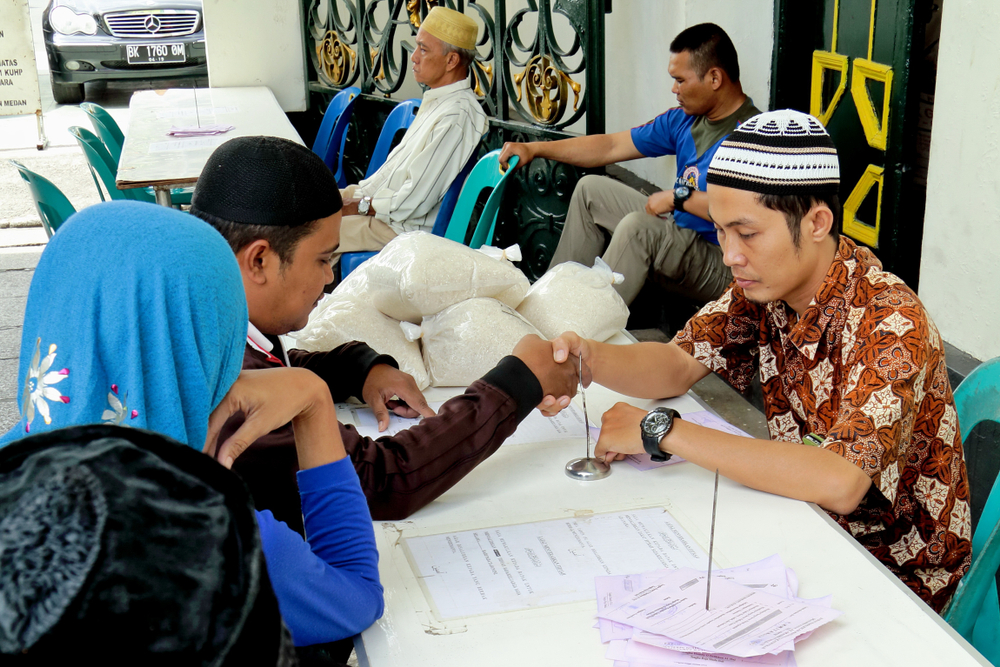Indonesia digitising Islamic social finance payments for mosques and cooperatives to better manage, distribute funds
JAKARTA - Indonesia’s government will digitise the traditional sadaqah donation system used by mosques, and develop a digital platform for zakat and waqf payments to help Islamic finance cooperatives better manage and distribute funds.
The digitisation of mosque sadaqah giving, which will use a QR code technology owned by state-owned digital payment system LinkAja, will start in August at the earliest, Ventje Rahardjo, executive director for the National Committee for Islamic Finance (KNKS), told Salaam Gateway.
“With the payment system we will replace cash donations at (physical) charity boxes,” said Rahardjo.
This digitisation process is happening along with the final stage of the national “Palapa Ring Project”—an infrastructure development to improve internet access in rural areas—to reach 800,000 mosques.
The digitisation of Islamic finance is one of KNKS’s top ten priority projects. The national committee will work with LinkAja to build a Shariah-compliant digital payment system and electronic money platform called LinkAja Syariah, that will be launched in August.
KNKS hopes LinkAja Syariah will make it easier for local communities to use e-commerce, perform banking transactions, give sadaqah and waqf, and fulfil their religious obligations such as paying zakat.
LinkAja is owned by four state-owned banks: Bank Mandiri, Bank BNI, Bank BRI and Bank BTN.
Rahardjo said KNKS, working with LinkAja, will design a platform that is as user-friendly as possible for mosque managers, who will be given access to their mosque’s database to manage their own donations and finances.
“From the smallest donations we can then tap in, distribute our zakat to them (the mosques) because there is a database,” said Rahardjo.
Mosques currently maintain their own manual, offline databases.
GOVERNMENT OVERSIGHT
KNKS plans to connect the mosque sadaqah database to a new zakat and waqf platform it is developing to better manage and distribute Islamic social finance funds.
“We’ll have three national databases: one for zakat, for waqf, and for the mosques, and they are interconnected so we can distribute the wealth better all over Indonesia,” said Rahardjo.
The government will have oversight and access to all three databases.
President Joko Widodo on Friday tweeted that there is a huge potential for the growth and distribution of zakat in Indonesia. Citing figures from the national zakat organisation BAZNAS, he said that in 2018, 8.1 trillion rupiah ($559 million) were collected in zakat. This is tiny compared to the potential zakat of 232 trillion rupiah ($16 billion), tweeted the president.
Badan Amil Zakat Nasional menyebutkan, sepanjang tahun 2018 zakat yang terkumpul sebesar Rp8,1 triliun. Sangat kecil dibanding perkiraan potensi zakat nasional 2018 sebesar 1,75 % dari PDB atau Rp232 triliun!
— Joko Widodo (@jokowi) May 17, 2019
Potensi pertumbuhan dan penyaluran zakat di negara kita sangat besar. pic.twitter.com/RIxGIGUEBl
FACILITATE WORK OF COOPERATIVES
The planned zakat and waqf databases will be integrated into the management of Islamic financial cooperatives, or the Baitul Maal wat Tamwil (BMT). The Baitul Maal part of BMT manages Islamic social finance funds while the Baitul Tamwil division acts as a cooperative Islamic microfinance institution. There are currently more than 5,000 BMTs across Indonesia.
“Because they’re small cooperatives they don’t have the capability to invest in risk management, IT operations etc, so we build the platform for them to use for free to help them to manage BMTs,” said Rahardjo.
The interconnected zakat and waqf databases will mean that BMTs will be able to better assess beneficiaries’ or clients’ financial profiles and needs.
“If they want to give loans, we can build a credit scoring system,” said Rahardjo, referring to the potential capabilities of the integrated system that will hold user data across contributions and payments of zakat and waqf.
With actual data in hand, BMTs and government bodies hope to more efficiently cater to the needs of users with regards assessment and distribution of Islamic social finance funds.
The aim is to lift rural mosque communities out of poverty and move them into the formal Islamic banking system.
According to Rahardjo, these initiatives are also meant to increase the market share of Islamic banks that still hold less than six percent of total banking assets.
(Reporting by Yosi Winosa; Editing by Emmy Abdul Alim emmy.alim@refinitiv.com)
© SalaamGateway.com 2019 All Rights Reserved
